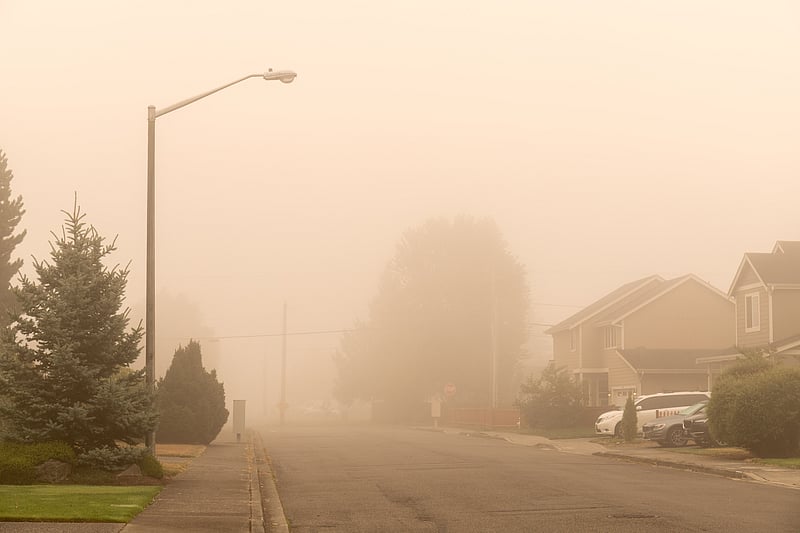We are now open at our new location. Visit us at 1914 Freedom Road (just down the road from our previous building).
Thank you for your support as we transition into this new space!
Get Healthy!

- Robin Foster
- Posted June 7, 2023
Smoke From Canadian Wildfires Blackens Skies, Prompts Air Quality Alerts in Much of U.S.
Wildfires that have been spreading throughout Canada in recent weeks are now spewing tons of smoke southward into the United States.
The smoke was so thick on Tuesday that New York City's skyline could not be seen clearly and air quality alerts were issued to residents from parts of the Northeast to the southern Mid-Atlantic region.
New York officials issued an air quality alert for much of the state on Wednesday.
"Exposure can cause short-term health effects such as irritation to the eyes, nose and throat, coughing, sneezing, runny nose, and shortness of breath," the alert warned. "Exposure to elevated levels of fine particulate matter [PM 2.5] can also worsen medical conditions such as asthma and heart disease. People with heart or breathing problems, and children and the elderly may be particularly sensitive to PM 2.5."
"While conditions are anticipated to temporarily improve later tonight through tomorrow morning, they are expected to deteriorate further tomorrow afternoon and evening," New York City Mayor Eric Adams said in a statement on Tuesday.
"We recommend all New Yorkers limit outdoor activity to the greatest extent possible. Those with preexisting respiratory problems, like heart or breathing problems, as well as children and older adults may be especially sensitive and should stay indoors at this time," Adams noted. "While all students should still go to school tomorrow, New York City public schools will not offer any outdoor activities on Wednesday."
Meanwhile, hazy conditions and smoke from the wildfires were reported from Cleveland to Buffalo, the Associated Press reported.
In North Carolina, the state's Department of Environmental Quality said the state would be under air quality alerts through Wednesday because of the "rapidly rising levels of fine particle pollution attributed to smoke"from the wildfires, the New York Times reported.
Until the smoke clears, residents are left to deal with the acrid smell of the huge smoke cloud.
Sal and Lilly Murphy, of Brooklyn, likened the burning scent to a campfire. They said they could even smell the smoke indoors, then walked outside and saw a sky that looked like it was about to storm, even though it wasn't. Lilly wore a mask for protection.
"It's a little scary,"Sal Murphy told the AP.
"When many New Yorkers walked outside today, the hazy skies caused by wildfire smoke were hard to miss," New York Gov. Kathy Hochul said in a statement issued Tuesday. "I encourage New Yorkers, especially those sensitive to air quality, to take appropriate steps to help limit risk of exposure."
In the meantime, one lung expert said residents of the affected areas can take other precautions to protect their airways.
"We have defenses in our upper airway to trap larger particles and prevent them from getting down into the lungs. These [smoke particles] are sort of the right size to get past those defenses,"Dr. David Hill, a pulmonologist in Waterbury, Conn., and a member of the American Lung Association's Board of Directors, told the AP. "When those particles get down into the respiratory space, they cause the body to have an inflammatory reaction to them."
So, what can you do to protect your lungs if you live in an area affected by the wildfires?
The U.S. Centers for Disease Control and Prevention offers this advice:
- Check local air quality reports. Listen and watch for news or health warnings about smoke, and pay attention to public health messages about safety measures.
- Keep indoor air as clean as possible. If you are advised to stay indoors, keep all windows and doors closed. Run an air conditioner, but keep the fresh-air intake closed and the filter clean to prevent outdoor smoke from getting inside. If you do not have an air conditioner and it is too warm to stay inside with the windows closed, go to a designated shelter away from the affected area.
- Avoid activities that increase indoor pollution. Burning candles, fireplaces and gas stoves can increase indoor pollution. Vacuuming stirs up particles already inside your home, contributing to indoor pollution. Smoking also puts even more pollution into the air.
- Follow the advice of your doctor or other health care provider about medicines and about your respiratory management plan if you have asthma or another lung disease. Consider evacuating if you are having trouble breathing. Call your doctor for advice if your symptoms worsen.
- If you are pregnant, talk to your health care provider about where to get prenatal or delivery services if the office is closed. Know the signs of labor and early labor. If you have these signs, call your health care provider or 9-1-1, or go to the hospital right away if it is safe to travel.
- Do not rely on dust masks for protection. Paper masks commonly found at hardware stores are designed to trap large particles, such as sawdust. These masks will not protect your lungs from the small particles found in wildfire smoke. However, N95 masks do work on fine particulate matter.
Hill also noted It's a good time to put off that yard work and outdoor exercise. If you go out, consider wearing an N95 mask, to reduce your exposure to pollutants, he added.
More information
Visit the U.S. Environmental Protection Agency for more on the health dangers of wildfires.
SOURCE: Associated Press; New York Times










